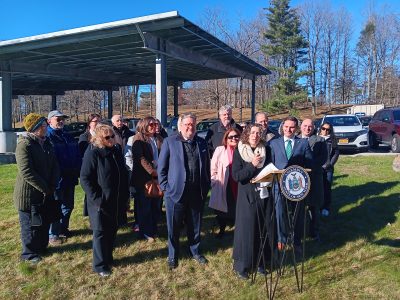State Legislator Proposes Bill to Allow for Solar Canopies at Parks
News Based on facts, either observed and verified directly by the reporter, or reported and verified from knowledgeable sources.

Three local state representatives are pressing for legislation to be approved that would allow municipalities to build solar canopies over parking lots at parks by avoiding the time-consuming need for land alienation.
Assemblywoman Dana Levenberg (D-Ossining) is sponsoring a bill that would help to streamline the process of having to swap what is now technically parkland to enhance the generation of renewable energy.
Under the legislation, parking lots at designated municipal, county or state parks would be exempt from going through the parkland alienation process and see the canopies built with solar panels on top, which has become increasingly popular at various facilities as a strategy to increase renewable energy output.
Current state law requires a local government to be considered for special legislation for each project to avoid having to replace the lost parkland with comparable acreage. That unnecessary process with respect to parking lots can take several years to complete in each instance and is unnecessary, Levenberg argued.
“It’s really not being used for anything right now, and we have the capability to use that air space to produce clean, renewable energy by constructing solar canopies,” Levenberg said.
She was joined at a press conference last week outside Ossining’s Brookside School, which has a solar canopy over its parking lot, by state Sen. Peter Harckham (D-Lewisboro) and Assemblyman Matt Slater (R-Yorktown) along with representatives from local government and environmental groups to push for the legislation. It was been approved three times by the state Senate but lawmakers have failed to get the measure out of committee in the Assembly.
The impetus for the bill came from Slater, the former Yorktown supervisor, when the town hoped to construct a carport over the parking lot at Granite Knolls Park. However, officials there faced the obstacle of parkland alienation, which prevented them from moving ahead with the project.
The materials to build the canopy are still being housed by the town, Slater said.
“This is about the environment, it’s about renewable energy, but it’s also about practicality,” Slater said. “For us to have to go get land alienation at a park is simply silly, and really, I think, hinders the development of these important pieces in our community.”
Harckham said his office crafted the Senate legislation in hopes of helping municipalities after Slater brought the Yorktown situation to his attention. The legislation, if passed and signed into law, would likely increase the number of canopies closer to New York City rather than primarily on farms upstate.
“We’re here today to support our colleagues in the Assembly this year so we can get it to the governor’s desk,” Harckham said. “We must get it signed. This is low-hanging fruit. This is the year and we have to support our Assembly members to get it done in the Assembly.”
The three state lawmakers were uncertain why it has not received support to get it to the Assembly for a vote the three previous times.
However, others on hand spoke of the environmental benefits and how it could significantly boost the output of New York’s renewable energy. Peter McCartt, Westchester County’s director of energy and sustainability, said acres of parking lots at Jones Beach on Long Island sit unused for most of the year and could produce megawatts of solar energy.
“This is really the game-changer we need here in New York State and across the county, frankly,” McCartt said. “Adding the canopies makes so much sense. They have so many different benefits.”
Other benefits would allow communities to offer more community solar programs for people who don’t have private homes or whose house isn’t properly situated for solar panels and creating more shade for people who park their cars in these lots during warm weather.
Croton-on-Hudson Deputy Mayor Len Simon said it would also help the state reach its goal of having 70 percent of its power produced by renewable energy by 2030. Installing more solar on top of canopies is “the next logical step,” Simon said.
“As our climate crisis deepens and our solar energy potential grows, our laws must evolve to meet the needs of tomorrow,” he said. “That’s the promise of this legislation and we look forward to its passage.”

Martin has more than 30 years experience covering local news in Westchester and Putnam counties, including a frequent focus on zoning and planning issues. He has been editor-in-chief of The Examiner since its inception in 2007. Read more from Martin’s editor-author bio here. Read Martin’s archived work here: https://www.theexaminernews.com/author/martin-wilbur2007/
